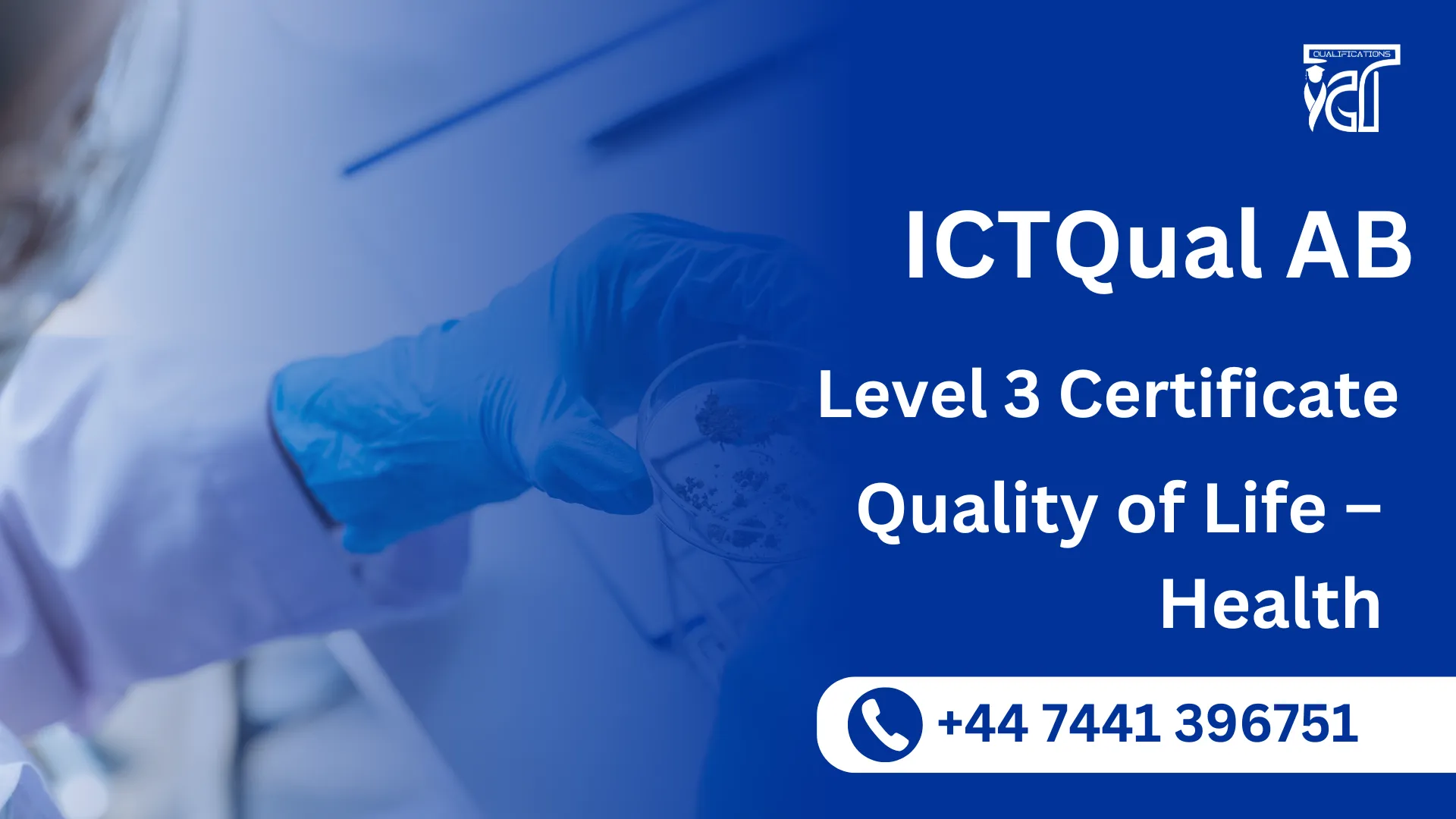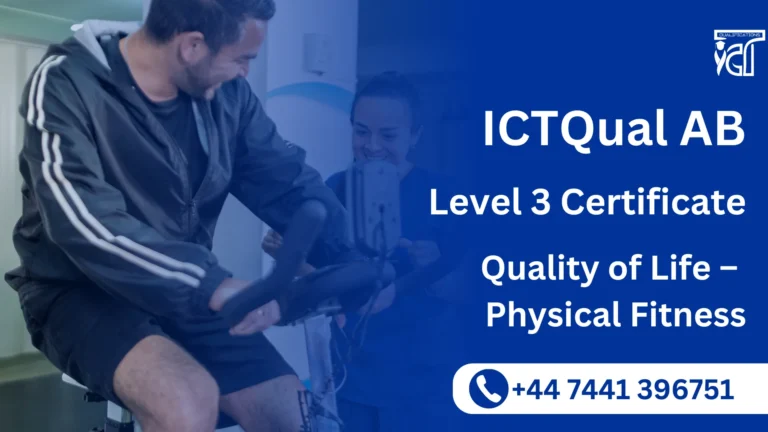The ICTQual AB Level 3 Certificate in Quality of Life – Health is designed to explore how physical, mental, and social well-being form the foundation of a fulfilling life. Health is more than the absence of illness; it is a dynamic state that enables individuals to thrive, participate fully in society, and achieve personal goals. This course highlights the essential role of health in shaping resilience, productivity, and overall quality of life.
Learners will examine the key dimensions of health, including nutrition, physical activity, mental wellness, and access to healthcare services. The program emphasizes the importance of preventive measures, healthy lifestyles, and equitable healthcare systems in promoting long-term well-being.
Through case studies, reflective exercises, and applied learning, participants will gain practical insights into how health policies, community initiatives, and personal choices contribute to improved life outcomes. They will also explore global health challenges, the impact of technology on healthcare, and strategies for fostering inclusive and sustainable health practices.
Ultimately, this qualification equips learners with the knowledge and skills to understand health as a cornerstone of quality of life. It prepares them to contribute meaningfully to initiatives in healthcare, community development, and wellness promotion, ensuring that health is recognized as a vital driver of human dignity and social progress.
ICTQual AB Level 3 Certificate in Quality of Life – Health
This qualification, the ICTQual AB Level 3 Certificate in Quality of Life – Health, consists of 3 mandatory units.
| Sr# | Unit Title |
| 1 | Foundations of Health and Quality of Life |
| 2 | Determinants of Health and Wellbeing |
| 3 | Community Health and Public Wellbeing |
Learning Outcomes for the ICTQual AB Level 3 Certificate in Quality of Life – Health:
Foundations of Health and Quality of Life
By the end of this unit, learners will be able to:
- Define health as a multidimensional concept including physical, mental, and social wellbeing.
- Explain the relationship between health and overall quality of life.
- Analyse how lifestyle choices influence personal health outcomes.
- Identify the role of healthcare systems in supporting wellbeing.
- Evaluate the importance of preventive health in maintaining long‑term quality of life.
- Reflect on personal health practices and their impact on wellbeing.
- Compare different cultural perspectives on health and life satisfaction.
- Apply theoretical frameworks to assess the role of health in human development.
Determinants of Health and Wellbeing
By the end of this unit, learners will be able to:
- Identify key social, economic, and environmental determinants of health.
- Analyse how education, income, and housing affect health outcomes.
- Evaluate the impact of inequality and discrimination on access to healthcare.
- Demonstrate understanding of the role of public policy in shaping health opportunities.
- Assess the influence of cultural and community factors on wellbeing.
- Interpret data and case studies to explain health disparities.
- Reflect on how determinants of health apply to personal and community contexts.
- Propose strategies to reduce barriers and promote equitable health outcomes.
Community Health and Public Wellbeing
By the end of this unit, learners will be able to:
- Explain the role of community health initiatives in improving quality of life.
- Analyse the effectiveness of public health campaigns in promoting wellbeing.
- Evaluate the importance of collaboration between healthcare providers, NGOs, and governments.
- Demonstrate understanding of global health challenges such as pandemics, malnutrition, and chronic diseases.
- Assess the role of community engagement in shaping health outcomes.
- Reflect on ethical considerations in public health interventions.
- Apply knowledge to design or critique a community health initiative.
- Propose strategies for sustainable improvements in public wellbeing.
Health is the foundation of a fulfilling life, influencing personal well-being, productivity, and social progress. This qualification equips learners with the knowledge and skills to understand how physical, mental, and social health contribute to overall quality of life, while promoting sustainable and inclusive health practices.
1. Strengthened Knowledge of Health and Well-Being
- Gain a clear understanding of the dimensions of health: physical, mental, and social.
- Learn how nutrition, lifestyle, and preventive care impact long-term well-being.
- Explore global health challenges and the importance of equitable healthcare access.
2. Enhanced Analytical and Practical Skills
- Develop the ability to assess health-related practices and identify areas for improvement.
- Strengthen problem-solving skills by exploring strategies for promoting healthier communities.
- Build competence in evaluating health policies, wellness initiatives, and sustainable healthcare systems.
3. Improved Career Opportunities
- Position yourself for roles in health promotion, community development, wellness programs, or social policy.
- Enhance employability in sectors such as healthcare support, NGOs, education, and public administration.
- Acquire transferable skills in advocacy, evaluation, and program design.
4. Contribution to Individual and Societal Well-Being
- Support initiatives that promote healthier lifestyles and preventive healthcare.
- Contribute to community resilience by addressing health inequalities and challenges.
- Advocate for policies that balance healthcare innovation with accessibility and equity.
5. Pathways for Professional Growth
- Build a foundation for progression to higher-level diplomas in Health Studies, Community Development, or Social Sciences.
- Prepare for specialized certifications in Public Health, Wellness Coaching, or Healthcare Management.
ICTQual AB Level 3 Certificate in Quality of Life – Health is designed for individuals who want to understand how health contributes to overall quality of life. The ideal learner is someone motivated to explore the physical, mental, and social dimensions of well-being, and how these factors shape resilience, productivity, and community development.
1. Learners Interested in Health and Wellness
- Individuals who value the role of nutrition, physical activity, and preventive care in daily life.
- Those curious about how health practices influence personal fulfillment and social participation.
- Learners motivated to connect lifestyle choices with long-term well-being.
2. Learners Focused on Community and Social Development
- Candidates who want to explore how health impacts communities and national progress.
- Those interested in addressing health inequalities and promoting equitable access to care.
- Learners who enjoy analyzing policies and initiatives that strengthen public health systems.
3. Learners Committed to Advocacy and Change
- Individuals passionate about promoting healthier lifestyles and preventive healthcare.
- Those who want to contribute to initiatives that improve mental wellness and social inclusion.
- Learners motivated to support sustainable health strategies that balance innovation with accessibility.
4. Learners Seeking Career and Professional Growth
- Early-career professionals aiming for roles in health promotion, community development, wellness programs, or social policy.
- Experienced practitioners who want to expand their expertise in health studies and quality of life.
- Career changers seeking transferable skills in advocacy, evaluation, and program design.
- Learners aspiring to leadership positions in healthcare support, wellness initiatives, or social development.
ICTQual AB Level 3 Certificate in Quality of Life – Health provides learners with a strong foundation in understanding how health contributes to overall quality of life. It opens pathways to advanced study and professional opportunities in healthcare, wellness promotion, and community development.
1. Progression to Higher-Level Diplomas and Certifications
- Advance to Level 4 and Level 5 Diplomas in Health Studies, Public Health, or Community Development.
- Pursue specialized certifications in Wellness Coaching, Healthcare Management, or Health Promotion.
- Explore international programs in Global Health and Sustainable Healthcare Systems.
- Strengthen global employability with qualifications aligned to health and social care standards.
2. Career Development Opportunities
- Move into roles such as Health Promotion Officer, Community Wellness Coordinator, Healthcare Support Specialist, or Policy Assistant.
- Progress into supervisory or managerial positions in organizations focused on health, wellness, and social development.
- Apply skills in industries such as healthcare support, NGOs, education, and public administration.
3. Academic and Professional Pathways
- Use this qualification as a foundation for advanced study in health sciences, social sciences, or organizational management.
- Pursue higher-level diplomas or professional memberships in health and wellness organizations.
- Apply transferable skills in international contexts, supporting careers in global health initiatives and policy frameworks.
- Build credibility for roles in consultancy, advocacy, and program evaluation.
4. Long-Term Growth and Specialization
- Specialize in areas such as Preventive Healthcare, Mental Wellness, Nutrition and Lifestyle, or Health Policy.
- Contribute to consultancy roles advising organizations on health strategies and wellness programs.
- Prepare for leadership positions in sectors where health and well-being drive social and economic progress.
Entry Requirements
Learners must meet the following criteria to be considered for admission into the course:
- Age Requirement: Learners must typically be 18 years of age or older at the time of enrolment
- Educational Background: Completion of secondary school education or equivalent qualification. Prior Level 2 qualifications in social sciences, biology, or vocational training are helpful but not mandatory.
- Work Experience: Formal work experience is not mandatory, but 6–12 months of exposure to healthcare support, wellness promotion, or community development is beneficial. Relevant experience may include roles in health assistance, wellness coaching, social services, or community outreach.
- English Language Proficiency: Competence in English or the language of instruction is required to engage with course materials and assessments. Recommended proficiency at CEFR A2–B1 level or equivalent, covering both written and spoken communication.
Register Now
Qualification Process
Qualification Process for the ICTQual AB Level 3 Certificate in Quality of Life – Health
- Self-Assessment:
Begin by evaluating your eligibility to ensure you meet the qualification requirements, including work experience, knowledge, and language proficiency. - Registration:
Complete your registration by submitting the required documents, including a scanned copy of a valid ID, and paying the registration fee. - Induction:
An assessor will conduct an induction to confirm your eligibility for the course and explain the evidence requirements. If you do not meet the criteria, your registration will be cancelled, and the fee will be refunded. - Assignments & Evidence Submission:
Provide all assignments and the necessary evidence based on the assessment criteria outlined in the course. If you are unsure of the required evidence, consult with the assessor for guidance on the type and nature of evidence needed. - Feedback and Revision:
The assessor will review your submitted evidence and provide feedback. Evidence that meets the criteria will be marked as “Criteria Met,” while any gaps will be identified. You will be asked to revise and resubmit if needed. - Competence Evidence:
Submit final evidence demonstrating that all learning outcomes have been met. This evidence will be marked as “Criteria Met” by the assessor once it is satisfactory. - Internal Quality Assurance (IQA):
The Internal Quality Assurance Verifier (IQA) will review your evidence to ensure consistency, quality, and compliance with standards. - External Verification:
The IQA will submit your portfolio to ICTQUAL AB External Quality Assurance Verifiers (EQA) for final confirmation. The EQA may contact you directly to verify the authenticity of your evidence. - Certification:
Upon successful completion of all checks, ICTQUAL AB will issue your official certificate, confirming that you have attained the ICTQual AB Level 3 Certificate in Quality of Life – Health.







